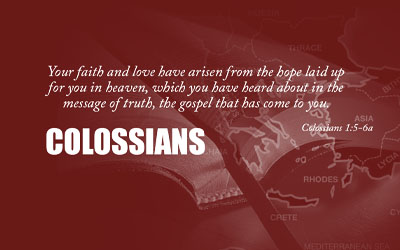Colossians 2:11-15
Circumcision done by Christ. Buried and raised with Christ by faith. All your transgressions forgiven. Certificate of indebtedness destroyed. Triumphant through the cross.
(Bấm vào đây để đọc tiếng Việt)
TRUE CIRCUMCISION
 "11In him you also were circumcised – not, however, with a circumcision performed by human hands, but by the removal of the fleshly body, that is, through the circumcision done by Christ." (Colossians 2:11—NET)
"11In him you also were circumcised – not, however, with a circumcision performed by human hands, but by the removal of the fleshly body, that is, through the circumcision done by Christ." (Colossians 2:11—NET)
There are numerous interpretations of circumcision in the Old Testament. However, given our theological conviction that almost all significant symbols or events in the Old Testament are shadows of the real things in the New Testament, we would be wise to interpret the meaning of Old Covenant circumcision in the context of the New Covenant.
In the above-quoted verse 5, two types of circumcisions are compared, but we learn a little more about Christ’s circumcision: it is done to “remove the fleshly body”. This fleshly body is not the same as the foreskin flesh removed by human hands. The former describes our fallen nature, while the latter is literally a part of human flesh.
Many religions recognize the problem with the “fleshly body” and devise numerous methods to eliminate it in order to ascend to a higher level of being. It is also referred to as the “body of death” in Romans 7:
24Wretched man that I am! Who will rescue me from this body of death? 25Thanks be to God through Jesus Christ our Lord! (Romans 7:24-25)
This “fleshly body” will be buried with Christ as we continue to the next verse.
So, now that we understand the meaning of the New Covenant circumcision by Christ, we can go back and interpret the meaning of its shadow, human-hand circumcision. Whatever cultural or historical meaning the human-hand circumcision may have, the only relevant meaning is that it points to Christ’s circumcision, the only circumcision that ushers us into God’s kingdom.
BURIED AND RAISED WITH CHRIST
“12Having been buried with him in baptism, you also have been raised with him through your faith in the power of God who raised him from the dead. (Colossians 2:12—NET)
What is the significance of being “buried” with Christ? All we need to do is understand why Christ died in the first place. He died for our sins so each sinner doesn’t have to die themselves to pay for their sins, because death is required of all sinners:
The soul that sinneth, it shall die. (Ezekiel 18:20)
The Bible implies that by saying we “have been buried” with Christ, we also died with him, so that all our debts are paid and we can now come to God with a clean slate. The issue of sin has been settled once and for all, as has all of the guilt associated with sin. What freedom and joy we now have as a result of Christ’s death on the cross, which religions have sought but failed to find throughout the ages.
We will not only be “buried” with Christ, but we will also be “raised” with him. The question of eternal life has also been settled. No longer should anyone who is in Christ wonder if they will be resurrected when Christ returns, but they should hold fast to the hope that God has promised them eternal life.
The question of whether or not you are worthy of heaven should be put to rest once and for all, because you are never and will never be, but Christ is, and he has given his worthiness to you as you believe in him.
You enjoy these generous gifts because it is “through your faith.” None of your efforts contribute to receiving these gifts. People frequently praised someone’s heart for being genuine, as if the quality of their hearts earned them some merit toward salvation. However, there is a significant difference between your faith and your heart. Your hope is in Christ with your faith, even if it is as small as a mustard seed, but when you cite your heart as the reason God saves you, you ask God to give you some credit. It is your faith in Christ that saves you, not the worthiness of your own heart, which is “extremely wicked” (Jeremiah 17:9-10).
ALL SINS FORGIVEN
“13And even though you were dead in your transgressions and in the uncircumcision of your flesh, he nevertheless made you alive with him, having forgiven all your transgressions. (Colossians 2:13—NET)
This verse presents another aspect of our salvation in addition to the benefit of Christ’s circumcision and our having been buried and raised with Christ. We all have the need of being forgiven because we all have failed to keep the commandments to fulfill God’s law.
This forgiveness of sins must be what Jesus is hinting at when he says:
Come to me, all you who are weary and burdened, and I will give you rest. (Matthew 11:28)
Those who are still burdened by the weight of the law long for this truth about the forgiveness of all our sins. Our Christian lives should be shining examples of this gift of forgiveness, but many Christians have forgotten what it was like to have their burden lifted for the first time. The Christian message is now filled with the call to obedience and repentance, which has never produced positive results throughout history. It’s no surprise that the unbelieving world rejects our message.
Go back to your first love when you were first forgiven of ALL your sins.
CERTIFICATE OF INDEBTEDNESS DESTROYED
“14He has destroyed what was against us, a certificate of indebtedness expressed in decrees opposed to us. He has taken it away by nailing it to the cross. (Colossians 2:14—NET)
What is a “certificate of indebtedness” exactly? It must be a compilation of your transgressions against God’s “decrees.” God pays off that debt by transferring all of our sins to Christ and nailing them to the cross alongside him. The debt has been completely paid off.
Some Christians, however, are still burdened with repaying a debt they believe they still owe. In their minds, Christ only paid for their past debts, and they are still responsible for future debts. They devised the idea of having their debt forgiven by confessing their sins, but there is only one source of support for this concept: 1 John 1:9.
Under the Old Covenant, animal sacrifices had to be offered for a temporary forgiveness of sins, then came under the New Covenant, Jesus was offered as a once-for-all sacrifice for sins. In both cases, the shedding of blood is required. As a result, verbal confession of sins does not satisfy either the Old or New Covenant requirements.
22Indeed according to the law almost everything was purified with blood, and without the shedding of blood there is no forgiveness. (Hebrews 9:22)
Almost all religions in the world treat sin as a central theme and devise methods to deal with it repeatedly throughout a believer’s life. Colossians 2:9 demonstrates true deliverance, in which the vicious cycle of sins and payments for sins is broken.
This is where Christians can encounter Jesus’ promise:
“Come to me, all you who are weary and burdened, and I will give you rest” (Matthew 11:28).
Likewise, where their thirst for righteousness can be quenched once and for all, as he promised the Samaritan at Jacob’s well:
“13Jesus replied, “Everyone who drinks some of this water will be thirsty again. 14But whoever drinks some of the water that I will give him will never be thirsty again, but the water that I will give him will become in him a fountain of water springing up to eternal life.”” (John 4:13-14)
VICTORY THROUGH THE CROSS
“15Disarming the rulers and authorities, he has made a public disgrace of them, triumphing over them by the cross. (Colossians 2:15—NET)
The “rulers and authorities” must be religious leaders wielding authority granted by law and statute. But how exactly did Jesus “disarm” them? He accomplished this by removing the very thing that grants them power: the law. Or, to put it another way, he removes the law from the equation by providing direct access to God through the cross.
By dying on the cross to grant those who believe access to the kingdom of heaven, Jesus effectively declares that sinners no longer require the rulers of their souls. In fact, with his teaching and proclamation of his divinity, Jesus frequently made a public spectacle of the religious leaders. The ultimate public show of his triumph is on display for all to see at the cross.
Rather than sending tens of thousands of angels from heaven to destroy sinners, Jesus chose to die on the cross to atone for their sins and save their souls. The cross is an abomination in and of itself, but it is God’s only means of reconciling the world to himself. When Peter wielded his sword against his opponents, he, like many others who wear the badge of Christianity today, did not understand the meaning and power of the cross for lasting change (John 18:10).
Nghi Nguyen
- Scripture quoted by permission. All scripture quotations, unless otherwise indicated, are taken from the NET Bible® copyright ©1996-2006 by Biblical Studies Press, L.L.C. All rights reserved.
Disclaimer: This is my own opinion on the topic, which does not necessarily reflect the church's theology, or beliefs of the individuals in it — Nghi Nguyen
